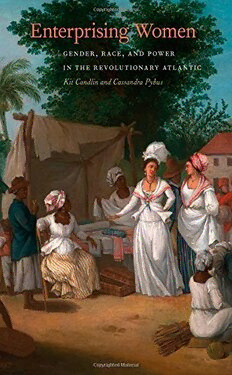
Enterprising Women: Gender, Race, and Power in the Revolutionary Atlantic PDF
Preview Enterprising Women: Gender, Race, and Power in the Revolutionary Atlantic
enterprising women Race in the Atlantic World, 1700–1900 Published in Cooperation with the Library Company of Philadelphia’s Program in African American History series editors Richard S. Newman, Rochester Institute of Technology Patrick Rael, Bowdoin College Manisha Sinha, University of Massachusetts, Amherst advisory board Edward Baptist, Cornell University Christopher Brown, Columbia University Vincent Carretta, University of Maryland Laurent Dubois, Duke University Erica Armstrong Dunbar, University of Delaware and the Library Company of Philadelphia Douglas Egerton, LeMoyne College Leslie Harris, Emory University Joanne Pope Melish, University of Kentucky Sue Peabody, Washington State University, Vancouver Erik Seeman, State University of New York, Buffalo John Stauffer, Harvard University enterprising women Gender, Race, and Power in the Revolutionary Atlantic kit candlin and cassandra pybus The University of Georgia Press Athens and London © 2015 by the University of Georgia Press Athens, Georgia 30602 www.ugapress.org All rights reserved Set in Adobe Caslon Pro by Graphic Composition, Inc. Printed and bound by Thomson-Shore, Inc. The paper in this book meets the guidelines for permanence and durability of the Committee on Production Guidelines for Book Longevity of the Council on Library Resources. Most University of Georgia Press titles are available from popular e-book vendors. Printed in the United States of America 14 15 16 17 18 c 5 4 3 2 1 Library of Congress Cataloging-in-Publication Data Candlin, Kit. Enterprising women : gender, race, and power in the revolutionary Atlantic / Kit Candlin and Cassandra Pybus. pages cm. — (Race in the Atlantic world, 1700–1900) Includes bibliographical references and index. iSBn 978-0-8203-4455-3 (hardcover : alk. paper) — iSBn 0-8203-4455-9 (hardcover : alk. paper) 1. Racially mixed women—Caribbean Area—History—19th century. 2. Women, Black—Caribbean Area—History—19th century. 3. Businesswomen—Caribbean Area—History—19th century. 4. Social stratification—Caribbean Area—History—18th century. I. Pybus, Cassandra. II. Title. hq1501.C35 2014 305.40896'9729—dc23 2014011856 ISBNfordigitaledition:978-0-8203-4779-0 British Library Cataloging-in-Publication Data available O brave new world, that has such people in it! —Miranda in Shakespeare’s The Tempest This page intentionally left blank contents Acknowledgments ix introduction. Elisabeth and Her Sisters 1 chapter one. The Free Colored Moment War and Revolution in a Brave New World 15 chapter two. Bars, Brothels, and Business Rachael Pringle Polgreen and Rosetta Smith 32 chapter three. By Labors and Fidelity Judith Philip and Her Family 57 chapter four. A Lasting Testament of Gratitude Susannah Ostrehan and Her Nieces 80 chapter five. The Queen of Demerara Mrs. Dorothy Thomas 103 chapter six. By Habit and Repute The Intimate Frontier of Empire 126 chapter seven. Uncertain Prospects Mixed- Race Descendants at the Heart of Empire 147 Conclusion 169 Notes 181 Bibliography 215 Index 231 This page intentionally left blank acknowledgments t his book has required extensive research in far- flung places that would not have been possible without generous grants from the Australian Research Council, which also provided a five- year professorial fellowship for Cassandra Pybus and a four- year postdoctoral fellowship for Kit Candlin. We owe a huge debt of gratitude to independent researchers Chris Rath- bone, John Wilmer, and David Alston, who have unstintingly shared re- search with us that has proved invaluable. Equally invaluable has been the generous assistance we received from Curtis Jacobs of the University of the West Indies in Grenada. We cannot thank these people enough. We are also indebted to the Legacies of British Slave- Ownership team working at University College, London, under the direction of Catherine Hall, and in particular we want to acknowledge the help we received from Nick Draper. Over the years we have been encouraged and stimulated by discussions with numerous scholars and especially wish to acknowledge Gad Heuman, Barry Higman, Lucy Frost, Jerry Handler, Daniel Livesay, Peter Hulme, Catherine Hall, Richard Drayton, Rebecca Scott, Maya Jasanoff, Marcus Rediker, and Richard Newman. We have been more than fortunate to work in an outstanding intellectual environment in the School of Philosophical and Historical Inquiry at the University of Sydney, and we are grateful for the support we have received from the school and from Maria Cortes and Cam Pham in particular. Spe- cial thanks are due to Andrew Fitzmaurice, the head of the Department of History, and to our colleagues in the research support group: Penny Rus- sell, Kirsten McKenzie, Clair Lowry, Blanca Tovias, Ann Cuthoys, Richard White, Mark McKenna, Judy Keene, and Cindy McCreery. For their personal support and their generous offers of accommodation, we thank Jo Pearson, Adam Low, Peter Hulme, and Tain and Grace Tomp- kins. For their research and editoral assistance, we thank Darien Rozental, Justine Greenwood, Sarah Crawford, and Keren Lavelle. Archives were indispensable to this book, and we are more than grateful to the staffs of the National Archives of the United Kingdom, the Na-
